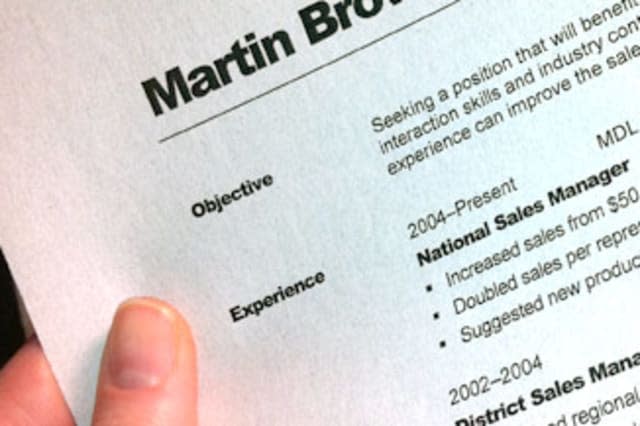How to kill your job application from the start

Remember all those hours you spent carefully crafting your CV? You may have been wasting your time.
Recruiters have revealed what they really care about when picking out job applications to take to the next stage, and it's very different to what most job-seekers think.
After surveying its clients, recruitment company Michael Page has revealed that while nearly three quarters of British job-seekers think a personal interest section is important, only four in ten recruitment consultants say the same.
Nor are they particularly interested in so-called 'soft skills' like the ability to work well in a team. While 89% of the public believe it's important to include this sort of thing in a CV, only 55% of recruiters agree.
And while more than half of Brits think it's important to include volunteering experience, only 11% of recruitment consultants agree; similarly, 85% say experience of working abroad is unimportant.
"The surveys revealed that the general public and recruitment consultants agree that working for a well-known brand, having more experience than the job requires, and staying at the same company for more than four years strengthens your CV," says Michael Page.
"Staying at the same company for ten years, though, actually weakens your CV, according to 36% of recruiters, despite what 70% of the British public think."
We're often told that we should keep our CVs to under two pages in length - and 83% of people have taken this on board. Unfortunately, nobody seems to have told recruiters, with only 32% thinking it matters.
And as for enclosing a photograph of yourself, forget it - three quarters of recruiters say it actually weakens your CV.
Meanwhile, you may want to think again about the language that you've used. Business network LinkedIn has revealed the top ten buzz-words that are guaranteed to make a recruiter wince, with 'motivated' leading the list, followed by 'passionate', 'creative', 'driven' and 'extensive experience'.
Rounding out the top ten are 'responsible', 'strategic', 'track record', 'organisational' and 'expert'.
As Darain Faraz, head of consumer PR at LinkedIn comments: "We wouldn't describe ourselves as 'strategic', 'driven' or as having 'extensive experience' in real life situations, so why do it on a LinkedIn profile?"
Better, say recruiters, is to use clear, everyday language - and make sure it's all spelled correctly and grammatically correct. While job applicants don't appear to realise it, this is actually the most important change you can make to improve your chances.
Last year, research by jobs search engine Adzuna found that as many as one in three CVs contained at least one spelling error - indeed, one of the 3,000 it looked at had an extraordinary 23 mistakes.
The most frequently misspelled word was 'responsibility', followed by 'liaise'; rather worryingly, 'university' was third, implying that many graduates can't have been paying a great deal of attention while they were there.
The other words causing particular problems were 'experience', 'speciality,' 'communication', 'achievement', 'management', 'environment' and 'successful'.
"Spelling mistakes are a huge red flag for potential employers, and candidates need to take care to show their best side to hiring managers if they hope to make the interview stage," says Adzuna chief executive Andrew Hunter.
Similarly, casual or sloppy phrasing will put potential employers off, with recruiters highlighting the importance of keeping a professional tone.
%VIRTUAL-ArticleSidebar-jobs-guide%
The other really important thing in a CV, according to recruiters, is to give plenty of specific detail of your responsibilities and achievements in previous roles. This is one of the areas where the bugbear buzzwords are most likely to creep in, often at the expense of actual facts.
The key thing is to give precise, specific details of what you've achieved, says Kim Isaacs, a CV expert at jobs website Monster. For example, rather than saying 'managed sales team', say that you 'recruited, trained and supervised a sales team of ten'.
"If you show that you consistently produced positive results for previous employers, you will be seen as a desirable candidate," she says. "The key is to emphasise your accomplishments and provide proof of your potential value."
The five most important CV elements, according to recruiters
Avoiding misspellings and typos
Avoiding grammatical errors
Including specific details of what you have achieved in previous roles
Using a professional tone
Including specific details of your responsibilities in previous roles
The five least important CV elements, according to recruiters
Whether you put education before experience or vice versa
Keeping your CV under two pages
Writing in the third person
Having experience working abroad
Including volunteer experience





